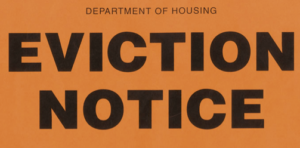Every landlord wants that dream tenant – the one who pays on time, keeps the place clean, and follows the rules detailed in the lease. Unfortunately, someday you may face having a tenant who is none of those things, leaving you with the difficult decision to take legal action and evict them.
 Eviction requires a specific set of regulations and legalities to follow, so it’s important to know the proper steps to take if you are in the position to evict. The tenant has their own set of rights, so even if you feel like you want to evict base on actions taken (or not taken), check first to make sure it is within eviction rules.
Eviction requires a specific set of regulations and legalities to follow, so it’s important to know the proper steps to take if you are in the position to evict. The tenant has their own set of rights, so even if you feel like you want to evict base on actions taken (or not taken), check first to make sure it is within eviction rules.
Late or Non-Payment: You can evict your tenant for not paying rent on time or defaulting on payments. One late payment won’t warrant eviction, but several months without any payment certainly does! If a renter habitually pays late, write written notices for late rent and keep a record of it. This will support your case down the line if the issue continues to be a problem.
Not Following the Lease Agreement: Violating rental or lease agreements is also grounds for eviction. If the lease clearly states no pets and pets are discovered within the unit, the tenant should be offered a chance to rectify the situation, but if they do not comply, that is grounds for removal. Well-worded and thorough lease agreements will help you in the long run when it comes to details on what can and cannot be done on your property.
Property Damage: Improperly maintaining the unit or property, significant damage, and extreme cleanliness issues can also be reasons to start to eviction process. Wear and tear (nail holes, minor carpet staining, etc.) would not be enough, but more major damage that will devalue your property is. If you offer your tenant a chance to fix the damage and they don’t make the repairs, you have the right to take action.
Illegal Purposes: Illegal activities of any sort done on your property can also be grounds to remove your tenants. Contact authorities and keep good records of suspicious activity if you think something is going on in the rental unit that may be against the law. Becoming a nuisance to neighbors or other tenants, though not illegal, can also qualify if it becomes an ongoing and frequent issue.
What are your next steps if you feel it’s time to evict your troublesome tenant? You must start with a written eviction notice. You can offer your tenant the opportunity to fix the problem, whether that be paying back rent or removing a pet from the premises. If not completed within the given time period, you can move forward with the eviction process by filing an “Unlawful Detainer” with the local court system and following the laws stated by the county you live.
While eviction is a relatively easy process and generally short court proceedings, it can be a stressful situation for you. By keeping good, written records of all communication and problems with the tenant and following the legal process by the letter, you can defend yourself, win your case, and evict a problem tenant, hopefully replacing them with a dream tenant you hope renews their lease year after year!





 Nicole Burns
Nicole Burns

 Katie O’Brien
Katie O’Brien

 Matthew Johnson
Matthew Johnson Nicki Teldeschi
Nicki Teldeschi David Carlson
David Carlson